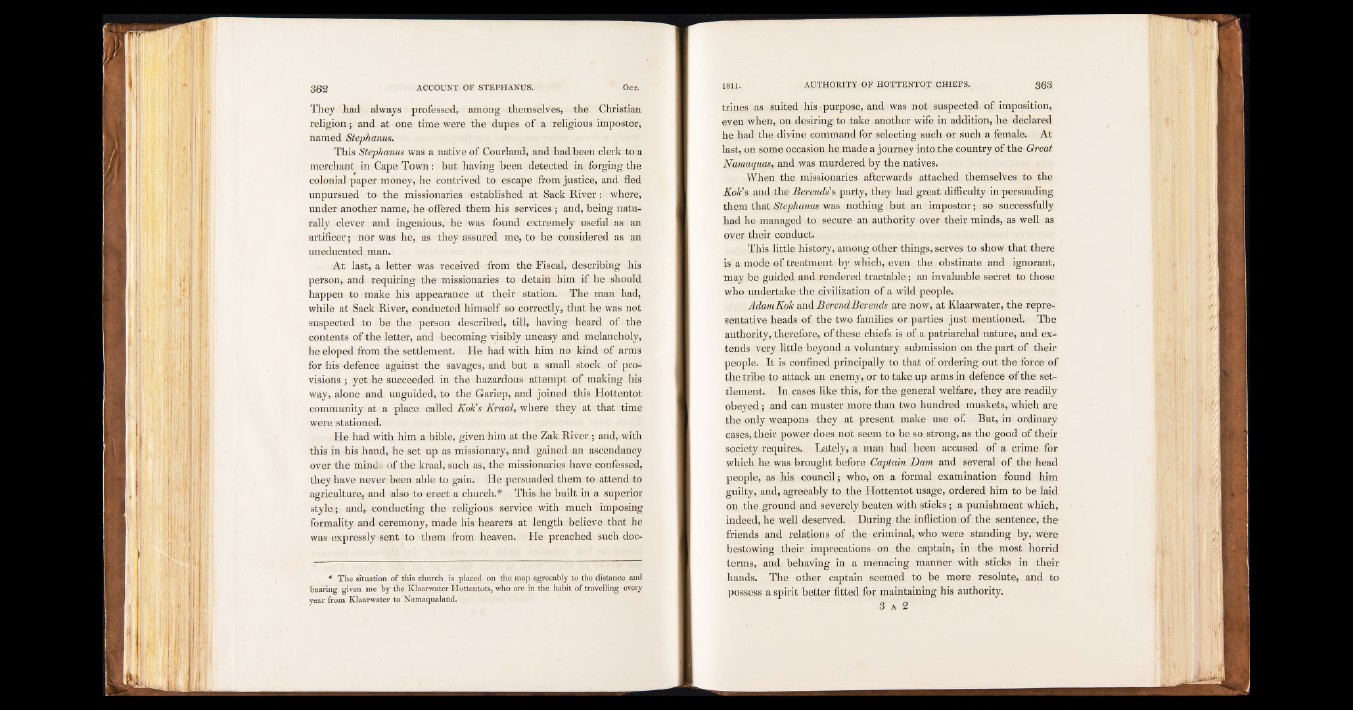
They had always professed, among themselves, the Christian
religion; and at one time were the dupes of a religious impostor,
named Stephanus.
This Stephanus was a native of Courland, and had been clerk to a
merchant in Cape Town: but having been detected in forging the
colonial paper money, he contrived to escape from justice, and fled
unpursued to the missionaries established at Sack River: where,
under another name, he offered them his services ; and, being naturally
clever and ingenious, he was found extremely useful as an
artificer; nor was he, as they assured me, to be considered as an
uneducated man.
At last, a letter was received from the Fiscal, describing his
person, and requiring the missionaries to detain him if he should
happen to make his appearance at their station. The man had,
while at Sack River, conducted himself so correctly, that he was not
suspected to be the person described, till, having heard of the
contents of the letter, and becoming visibly uneasy and melancholy,
he eloped from the settlement. He had with him no kind of arms
for his defence against the savages, and but a small stock of provisions
; yet he succeeded in the hazardous attempt of making his
way, alone and unguided, to the Gariep, and joined this Hottentot
community at a place called KoJcs Kraal, where they at that time
were stationed.
He had with him a bible, given him at the Zak River ; and, with
this in his hand, he set up as missionary, and gained an ascendancy
over the minds of the kraal, such as, the missionaries have confessed,
they have never been able to gain. He persuaded them to attend to
agriculture, and also to erect a church.* This he built in a superior
style ; and, conducting the religious service with much imposing
formality and ceremony, made his hearers at length believe that he
was expressly sent to them from heaven. He preached such doc*
The situation of this church is placed on the map agreeably to the distance and
bearing given me by the Klaarwater Hottentots, who are in the habit of travelling every
year from Klaarwater to Namaqualand.
trines as suited his purpose, and was not suspected of imposition,
even when, on desiring to take another wife in addition, he declared
he had the divine command for selecting such or such a female. At
last, on some occasion he made a journey into the country of the Great
Namaquas, and was murdered by the natives.
When the missionaries afterwards attached themselves to the
Role’s and the Berends's party, they had great difficulty in persuading
them that Stephanus was nothing but an impostor; so successfully
had he managed to secure an authority over their minds, as well as
over their conduct.
This little history, among other things, serves to show that there
is a mode of treatment by which, even the obstinate and ignorant,
may be guided and rendered tractable; an invaluable secret to those
who undertake the civilization of a wild people.
AdamKok and BerendBerends are now, at Klaarwater, the representative
heads of the two families or parties just mentioned. The
authority, therefore, of these chiefs is of a patriarchal nature, and extends
very little beyond a voluntary submission on the part of their
people. It is confined principally to that of ordering out the force of
the tribe to attack an enemy, or to take up arms in defence of the settlement.
In cases like this, for the general welfare, they are readily
obeyed; and can muster more than two hundred muskets, which are
the only weapons they at present make use of. Rut, in ordinary
cases, their power does not seem to be so strong, as the good of their
society requires. Lately, a man had been accused of a crime for
which he was brought before Captain Dam and several of the head
people, as his council; who, on a formal examination found him
guilty, and, agreeably to the Hottentot usage, ordered him to be laid
on the ground and severely beaten with sticks; a punishment which,
indeed, he well deserved. During the infliction of the sentence, the
friends and relations of the criminal, who were standing by, were
bestowing their imprecations on the captain, in the most horrid
terms, and behaving in a menacing manner with sticks in their
hands. The other captain seemed to be more resolute, and to
possess a spirit better fitted for maintaining his authority.
3 a 2